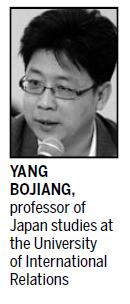Diaoyu Islands dispute a watershed
Editor's note: The illegal detention of a Chinese fishing trawler's captain and crew by Japan in September triggered a diplomatic row between Beijing and Tokyo, because Japan Coast Guard intercepted the Chinese vessel in the waters off the Diaoyu Islands, which is an integral part of China's territory. Four experts express their views on the dispute and how it can be resolved.
Focus on law of the sea
2009 and 2010 mark a qualitative change in China's development period, as well as its external environment. They can be divided into two parts: One is the relationship between China and the international community and the other, its ties with neighboring countries.

The United States' attempts to interfere in the South China Sea territorial disputes is one of the problems China is facing in its relation with the international community. After the sinking of the Republic of Korea's (ROK) corvette Cheonan, the ROK and Japan both updated their security strategies. An unusual event in Northeast Asia was Japan's participation in the US-ROK military drills as an "observer".
While summoning Japanese Ambassador to China Uichiro Niwa over the illegal detention of a Chinese fishing boat's captain and crew after it collided with two Japan Coast Guard ships near the Diaoyu Islands, China's State Councilor Dai Bingguo urged Japan not to make a wrong judgment of the situation. What Dai meant was Tokyo should not underestimate Chinese people's sentiments toward Japan.
Japan wrongly thought that China's diplomatic front was facing a number of challenges, because of which Beijing might ignore Tokyo's affront. But the fact was beyond its calculation.
China should strike the right balance in its relations with Japan to ensure stable bilateral ties, and promote the solution of major issues between the two neighbors.
If disputes over major issues that have emerged cannot be properly addressed, they could affect sound development of bilateral relations.
We should bear in mind that in the long run China-Japan relations cannot develop in a stable way without solving major issues. It was absurd for Japan to apply its domestic law to the Chinese fishermen because they were in the waters off the Diaoyu Islands, which since ancient times have been Chinese territory.
We have to break Japan's stance that it has no dispute with China over the islands. In fact, in the 1970s Japan was fully aware of and recognized the territorial dispute over the Diaoyu Islands.
In 1978, then vice-premier Deng Xiaoping successfully pushed the two countries to agree to "shelve bilateral disputes and seek common development" on the Diaoyu Islands issue. The two countries abided by the consensus for years.
But since the 1990s, the Japanese government has been insisting that there is no dispute.
While negotiating with Japan, China should pay more attention to law, including the United Nations Convention on the Law of the Sea and the China-Japan Fisheries Agreement.
 0
0 






